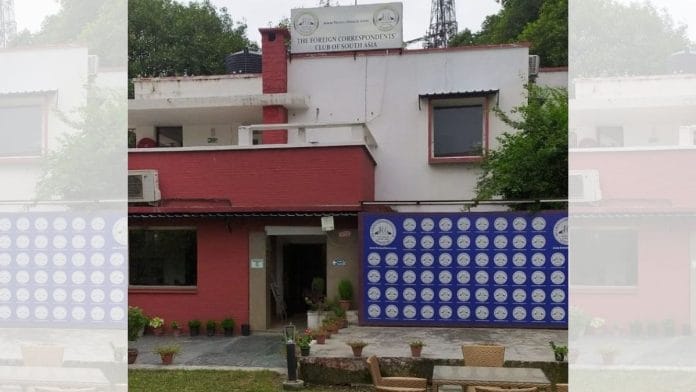New Delhi: After a prolonged slugfest at New Delhi’s Foreign Correspondents’ Club of South Asia (FCC), the members have finally elected a new president and general council after the polls were held formally at the club on 25 May.
Dr Waiel Awwad, senior international independent journalist from Syria, and Prakash Nanda, another senior journalist with EurAsian Times, were picked as president and secretary, respectively, for a two-year term.
P.M. Narayanan, a television journalist with ARD German TV was elected as the treasurer. Meanwhile, Mayank Bhardwaj (Reuters), Krishnan P. Nayar (Emirates News Agency), Anoop Saxena (ARD German Radio and TV), Devina Gupta (BBC), Eshani Mathur (Bloomberg), Rusalan Imaev (Russia Today), Sidhartha Srivastava (CAN), C.K. Nayak (Jan Aastha Abroad), and Amitav Srivastava (SABC), were elected as the nine members of the club’s general council.
The elections were preceded by the annual general body meeting within the FCC premises, and were held physically with a proper ballot system for the first time in 15 years.
New president Awwad replaced S. Venkat Narayan, veteran Indian journalist, against whom a sudden vote of no confidence had been passed at an emergency meeting of the managing committee in October last year, triggering a power tussle which lasted for months. Awwad was the vice president at the time.
Anoop Saxena of ARD German Radio, the governing committee member of FCC, told ThePrint that the election was conducted in a “free and fair” manner at the club, with at least 47 members turning up to choose the new body.
“We have a bunch of bona fide journalists there. FCC is an important platform for international media. Due to the controversy, several journalists had left the club completely, but now we are hoping that the situation will get better,” said Saxena.
He added that FCC has been an important platform to know more about what the international media is “thinking about India”.
“It’s a South Asia Hub through which we get to know what the journalists are writing about. FCC used to organise different events, including an annual function. All of that had stopped due to the controversy that happened, but now it will continue,” he said.
In October 2024, the FCC witnessed a significant leadership crisis that exposed deep divisions within the organisation. The turmoil began when eight members of the club’s managing committee convened an emergency meeting and passed a no-confidence motion against the then president Narayan, vice president Awwad, and general secretary Prakash Nanda.
The motion cited concerns over budget overruns related to an International Association of Press Clubs convention, and alleged a lack of transparency in the club’s operations.
Following the motion, Simran Sodhi and Sanjay Kumar were appointed the interim president and general secretary, respectively. However, the ousted leadership contested the legitimacy of the move, arguing that two of the eight committee members had been coerced into supporting the motion, and that one signatory’s membership had expired, rendering the vote invalid.
Consequently, Narayan issued show cause notices to Sodhi and Kumar, accusing them of anti-club activities, and later announced their “expulsion” from the FCC.
The conflict escalated with both factions issuing expulsions and counter-accusations, creating a climate of uncertainty. After a month of internal strife, the FCC reconstituted its governing committee, bringing in journalists like K.P. Nayar, foreign correspondent and TV commentator on diplomacy, and Moses Manoharan, editor-in-chief of foreign affairs journal Global Dialogue Review, along with special invitees, like The Indian Express’s contributing editor on international affairs C. Raja Mohan, and The Economic Times’s executive editor Pranab Dhal Samanta, in an effort to restore stability and credibility to the organisation.
Despite these efforts, tensions persisted. In March 2025, a physical altercation between candidates Munish Gupta and Pankaj Yadav had led to the indefinite postponement of the club’s elections and annual general meeting at the time.
(Edited by Mannat Chugh)
Also Read: A mock drill brings Delhi’s bustling Khan Market to a standstill. It’s the 1st of many more to come






